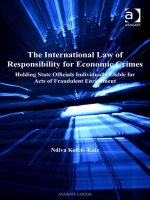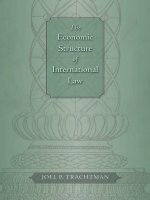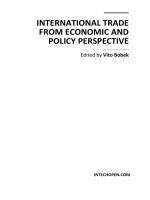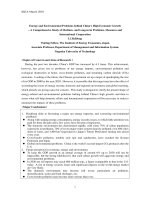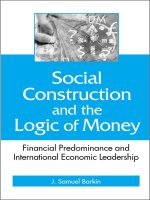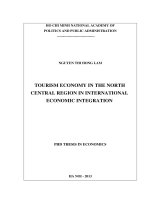International economic disintegration
Bạn đang xem bản rút gọn của tài liệu. Xem và tải ngay bản đầy đủ của tài liệu tại đây (15.35 MB, 299 trang )
INTERNATIONAL ECONOMIC
DISINTEGRATIONINTERNATIONAL ECONOMIC
DISINTEGRATION
BY
WILHELM
ROPKE, Ph.D.
PROFESSOR
OF
ECONOMICS
AT THE
GRADUATE
INSTITUTE OF INTERNATIONAL STUDIES, GENEVA
Author
of "
Crises
and
Cycles,"
"
German Commercial Policy,"
&c.
WITH
AN
APPENDIX
BY
ALEXANDER RUSTOW,
Ph.D.
PROFESSOR
AT
THE UNIVERSITY
OF
ISTANBUL
LONDON EDINBURGH GLASGOW
WILLIAM HODGE
AND
COMPANY, LIMITED
1942
TO
EVA ROPKE
MY COURAGEOUS COMPANION THROUGH
TURBULENT YEARS
MADE AND PRINTED IN GREAT BRITAIN
BY
WILLIAM HODGE AND COMPANY, LIMITED
LONDON EDINBURGH GLASGOW
The paper
and
binding
of
tins book conform
to the
authori
ed
economy standard
PREFACE
THE
idea of the present investigation originated in a conference of
economists, organized by the Rockefeller Foundation and held at
Annecy in July, 1936, for the purpose of discussing the most urgent
topics and the different possibilities of organized research in the field
of social science. At this conference there was general agreement
that, in view of the great structural changes taking place in the
economic system to-day, there should be organized an investigation
into " post-war agrarian and industrial protectionism." After I
had been charged, at the beginning of 1937, with the further
development of this project under the auspices of the Graduate
Institute of International Studies at Geneva, it was more speci-
fically defined as "an international investigation . . . into the
causes and reciprocal effects of industrial protectionism in the
agrarian states and of agrarian protectionism in the industrial
states,
which has been characteristic of post-war commercial policy
everywhere and particularly in Europe." " This policy, restric-
tive of international trade, has been both the expression and the
condition of the most significant structural changes within the
nations," the statement went on. " It is because the nations, for
various reasons, some economic, some political, some psychological,
have wished to become more independent of each other, that they
have resorted to new forms and to a larger measure of protectionism.
And this, in turn, has obliged their former suppliers to retaliate."
The first step to be taken evidently was to prepare a preliminary
outline of the different questions and sub-questions connected with
the solution of the problem and to array them systematically. This
outline—which I presented in March, 1937—was a comprehensive
inventory of the relevant questions without any indication of the
relative weight of their importance, and a first demarcation of the
scientific territory which was to be occupied and cultivated later
in the course of the inquiry. An indication of the philosophy
underlying this outline of the problem was given some months later
in my paper on " International Economics in a Changing World "
(The World Crisis, ed. by the Graduate Institute of International
Studies, London, 1938, pp. 275-292) and worked out more fully in
my other paper on the " Decisive Problems of the Disintegration
of World Economy " (Swedish, in " Ekonomisk Tidskrift,"
January,- 1939).
PREFACE
In accordance with the nature of this preliminary outline, it
was to be left to the later development of the research work to
regroup the different questions whilst the choice of the most
important problems was to be made as the progressive execution of
the programme demanded. After a preliminary examination of all
the relevant factors, the next task was to find out Avhat were really
strategic problems which dominated the whole situation, to discover
the knots where a number of causal threads met together, and thus
to condense the investigation, which at first sight seemed to be
discouragingly broad, into a limited number of parts forming a
logically coherent whole. It was obvious, however, that this was a
task which could only be performed during the course of the investi-
gation, since it was a very important part of this investigation
itself.
Only a continuous and patient study of the field of the investigation
could reveal the points on which everything else hinged, and any
objection to such a procedure would betray a misunderstanding of
that line of reasoning which was finally considered to be the most
fruitful. The real work had to be done by taking up now this, now
that causal thread, by connecting them and by experimenting with
solutions in order to see the true structure of the whole problem.
The first results of such a work are presented in this book.
To discover the strategic problems is an essential part of the
investigation itself since not only do these first reveal themselves in
the course of the actual study, but also the accomplishment of this
task is one of the main and most important results to be expected
from such an investigation. The phenomenon of the disintegration
of world economy presents itself as such an overwhelming and
bewildering mass of factors that any order brought into it would
mean an enormous progress over the present state of thought on the
subject, the most conspicuous feature of which is the general sense
of bewilderment and lack of real orientation. Not knowing, how-
ever, how to disentangle the causal threads in this phenomenon and
how to comprehend it in causal terms is generally only the first step
to accepting it as the result of historical " fate/' which simply
happens for unfathomable reasons and in face of which man feels
completely helpless. Lack of mental order and comprehension breeds
pessimism and resignation and thus becomes an important causal
factor in the further drift of international disintegration. A
successful reduction of this host of factors to a limited number of
strategic problems is, therefore, the first requisite of constructive
action.
From the beginning I was convinced that in order to carry out
vi
PREFACE
this ambitious and highly complex research programme, it was
necessary to avoid working with a co-operative research organization
before the foundations had been thought out thoroughly. Other-
wise,
it would be difficult to prevent such an investigation from
becoming an amorphous collection of studies lacking coherence and
directive ideas. It would not be indiscreet to suggest that in recent
years not a few research programmes seem to have suffered in this
respect.
Following this procedure I worked out, with a minimum of
assistance, the present study which—under the title of " Interim
Report on International Economic Disintegration "—was sent to a
number of experts in the summer of 1939. These experts were
invited to a small conference which was to have been held in Geneva
at the beginning of September when the report was to have been
critically examined and the further research procedure discussed.
Although the outbreak of war frustrated all these plans, it was sug-
gested that at least my report should be published in a definite form
after the necessary alterations and additions had been made, and a
number of suggestions and critical views collected. In presenting
now this final result I want to express rny sincerest thanks to all
those who helped me with this task. While my heaviest debt of
gratitude lies with the Rockefeller Foundation and with the
directors of the Graduate Institute of International Studies, Pro-
fessors Paul Mantoux, and William E. Rappard, I want to state
how much I owe especially to the very helpful suggestions and
criticisms made by Professor Howard S. Ellis (University of
California), Professor Allan G. B. Fisher (The Royal Institute of
International Affaires), and Professor Alexander Rustow
(University of Istanbul). The latter kindly contributed a special
memorandum attached to this volume. For the agricultural part I
enjoyed the help of Dr. Count Finckenstein, for the industrial
chapter that of Dr. E. Peltzer. The graphs have been made by Dr.
A. Kozlik (Ohio State College).
The purpose of this book is to make a new and more promising
approach to the diagnostics of that long-run crisis in international
economic relations which is one of the most striking symptoms of
the general economic, social, and political crisis of occidental
society. I believe that the urgent necessity of such an approach
has been enhanced rather than diminished by the outbreak of the
war. However, I would betray my own philosophy if I regarded
this book as anything more than a mere beginning, an invitation to
constructive criticism, and a way of opening or furthering a dis-
vii
PREFACE
cussion for which the world seems to be ripe. In submitting this
book to criticism, I am not afraid to expose myself as one w<ho
believes not only in the scientific legitimacy but even in the utmost
scientific necessity of employing a measure of judgments, which is
ultimately based on a definite conception of what is wrong with
the world, and of what should be done in order to put it right again.
Those who are shocked by such an attitude may be reassured that
I gave more thought to this methodological problem than I am
able to explain on this occasion.
1
It is hoped that anybody knowing the difficulties of publishing
a book under the present circumstances—especially if the author
and the publisher are separated by the main theatre of war—will
readily excuse both the delay in publication and the fact that when
the book finally comes out it will no longer be in accord in every
respect with the actual situation, in spite of the many efforts to
keep it up to date while the printing was being done. Therefore, an
appeal is being made to the chivalrous sentiments of the critics who
will easily console themselves with the many other aspects of the
book calling for criticism.
WILHELM ROPKE.
GRADUATE
INSTITUTE OF
INTERNATIONAL
STUDIES
(GENEVA),
1942.
1
Cf. my paper " A Value Judgment on Value Judgments " in which I am
explaining my attitude in this very important methodological question. It will
probably be published in the " American Economic Review."
PUBLISHERS'
NOTE
Owing to the difficulty of communicating with Professor Ropke
during the preparation of this work,
He
is not to be considered respon-
sible for every word of the text. The same applies to the Appendix
contributed by Professor Hiistow.
vin
CONTENTS
PAGE
INTRODUCTION
1
PART I
THE MEANING OF INTERNATIONAL ECONOMIC DISINTEGRATION
CHAPTER I
Historical Orientation ___._-_- 11
CHAPTER II
The Quantitative Aspect of International Economic Disintegration 23
CHAPTER III
The Qualitative Aspect of International Economic Disintegration
(Functional Disturbance) 30
(a) General Appraisal 30
(b) The Break in the Intercommunicating Character of World
Economy (Bilateralism and Formation of Economic
Blocs) 34
(c) The Erratic Character of World Trade 45
(d) The Break in the International Monetary and Financial
System 52
(e) The Increased International Immobility (Nationalization)
of Production Factors 52
(f) The Influence of the New Character of Protectionism - 56
CHAPTER IV
Conclusions - - 61
PART II
ECONOMIC AND SOCIO-POLITICAL INTEGRATION AND DISINTEGRATION
(The Extra-Economic Framework of World Economy)
CHAPTER V
The Importance of the Extra-Economic Framework for the working
of the Economic Process
67
CHAPTER
VI
Economic
and
Socio-Political Integration
and
Disintegration
in
the International Field
72
b
ix
CONTENTS
PAGE
PART III
THE MILITARY ASPECT OF ECONOMIC NATIONALISM
CHAPTER VII
The Non-Economic Aims of Economic Nationalism 85
CHAPTER VIII
Instrumental Analysis of the Military Argument 98
PART IV
THE AGRARIANIZATION OF THE INDUSTRIAL COUNTRIES
CHAPTER IX
Account of the Post-War Development - - - - - - 111
CHAPTER X
Changes in the International Localization of Agriculture - - 123
(1) Changes in the Technique of Agricultural Production - 124
(2) Changes in the Natural Factors of Agricultural Produc-
tion 126
(3) Changes in Market Conditions 127
(4) Changes in Transport - - - - - - - 128
(5) Changes in Adaptability of Agriculture - - - - 128
(6) Changes Brought About by Non-agricultural Competition 129
(7) Temporary and Lasting Changes - - - - - H30
CHAPTER XI
The Driving Forces of Agricultural Nationalism - 132
CHAPTER XII
The Methods of Agrarianization and Agricultural Nationalism - 1139
CHAPTER XIII
The Effects of Agricultural Nationalism - - - - - 142
CHAPTER XIV
Possibilities of Alternative Policies 150
(1) Constructive Programmes for Re-shaping Agriculture in
the Industrial Countries - - - - - - 150
(2) Present Situation and Future Prospects (National and
International) of Demand-Supply Equilibrium in Agri-
culture - - - - - - - - - 160
CONTENTS
PAGE
PART
V
THE INDUSTRIALIZATION
OF
AGRARIAN COUNTRIES
CHAPTER
XV
General Interpretation
- - - - - - - - 165
CHAPTER
XVI
Types and Stages
of
Industrialization
- - - - - -172
CHAPTER
XVII
Changes
in the
Localization Factors
of
Industrial Production
- 1175
(a) Changes
in the
Technique
of
Industrial Production
- - 1175
(b) Changes
in the
Labour Factor
of
Localization
- - 177
(c) Changes
in the
Capital Factor
of
Localization
- - 177
(d) Changes
in the
Significance
of Raw
Material Supplies
- 177
(e) Changes
in the
Consumption Factor
of
Localization
- 178
CHAPTER
XVIII
The Driving Forces
of
Industrialization To-day
- 1179
(a) Agricultural Overproduction
179
(b) Agrarian Overpopulation
- - - - - 179
(c)
The
Present Disturbances
in the
Mechanism
of
Inter-
national Trade
- - - - - - - - 1180
(d) Theories
and
Ideologies
in
Favour
of
Industrialization
- 180
CHAPTER
XIX
The Effects
of
Industrialization
182
PART
VI
CHAPTER
XX
The Disturbances
in the
Monetary-Financial Mechanism
of
World
Economy
il91
PART
VII
ECONOMIC
NATIONALISM
AND ECONOMIC STABILIZATION
CHAPTER
XXI
Introduction
- - - - 201
CHAPTER
XXII
Problems
and
Avenues
of
Research
203
(a)
The
Stabilizing
or
Unstabilizing Effect
of
Economic
Nationalism
_
203.
xi
CONTENTS
PAGE
(b) Protectionism
as an
Appropriate Measure
of
Business
Cycle Policy
for
Combating
the
Depression
- - - 204
(c) Economic Nationalism
as an
Auxiliary,
an
Instrument
or
a
Consequence
of the
Policy
of
National Economic
Stabilization
("
Full Employment
") - - - 205
PART VIII
INTERNATIONAL
ECONOMIC DISINTEGRATION
AND
CHANGES
IN
NATIONAL
EcoNOMrc
STRUCTURES
CHAPTER
XXIII
Introduction
- - - - - - - - - - 219
CHAPTER
XXIV
Ways
of
Research
-
_ _-_
222
PART
IX
CHAPTER
XXV
The Future
of
World Economy
and the
Rational Scheme
of
Inter-
national Division
of
Labour ______
233
PART
X
CHAPTER
XXVI
The International Economic Disintegration
as a
Problem
of the
Social
and
Political Structure
237
CHAPTER
XXVII
Epilogue
245
(1)
The Age of
Tyranny
245
(2)
The
Economic Outlook After
the
Present
War - - - 256
APPENDIX
GENERAL
SOCIOLOGICAL CAUSES
OP THE
ECONOMIC DISINTEGRATION
AND
POSSIBILITIES
OF
RECONSTRUCTION
- 267
xn
INTRODUCTION
Sometimes I fancy that there are still such crises in store,
especially for the Germanic
world,
that even the most illustrious
viri doctissimi with all their books may one day become obscure.
Jacob Burckhardt, letter to F. von Preen, 19th September, 1875.
IT
is an essential part of the general attitude underlying the present
investigation that it is based on the following assumptions :
(a) The constantly shifting scene of international economic
relations and of the State measures directed toward influencing
them, the oscillations of economic activity in the different countries,
the social and political disturbances and all the other phenomena,
which occupy the forefront of public attention, are only surface
symptoms of a deep-set structural change affecting our economic,
social, political and cultural system in its entirety and constituting
a major "historical crisis,"
1
the outbreak of which can be exactly
dated as July, 1914, but for the causes of which we must go still
further back.
(b) This crisis puts social science in a new situation, which is
itself highly critical and which no partial investigation in any
field of this science whatever can ignore without running the risk
of missing its aim. Nobody conversant with the current develop-
ment of the social sciences can overlook the fact that the feeling of
being on insecure ground is becoming more and more widespread,
until even the most tenacious followers of the traditional lines of
approach sense the need for reorientation. The growing literature
on methodological questions even in countries like England, where
it was formerly distinctly unpopular, is a sure token of this scientific
situation, as is also the fact that it has been felt necessary to open
the present report in such a roundabout way as would have appeared
rather strange even five years ago.
2
As the present historical crisis finds its first, its most painful
and its most conspicuous manifestation in the economic sphere, and
since the nineteenth century has accustomed us to treat the economic
problems as the main ones, it is easy to understand why the crisis
1
The term "historical crisis" is used here in the sense made familiar by
Jacob Burckhardt, the great Swiss historian, by his essay on "Die geschichtlichen
Krisen" (Weltgeschichtliche Betrachtungen, 4th edn., Stuttgart, 1921, pp. 160-209).
2
The following pages are largely based on a memorandum which the author
ote together with Professor Alexander Rustow (University of Istanbul) in the
f 1938
wrote g
summer of 1938
INTERNATIONAL ECONOMIC DISINTEGRATION
is conceived primarily as an economic one and why, therefore, the
traditional approaches of economics have been relied upon thus
far. Whether or not this traditional conception corresponds to the
inner convictions of our scholars and statesmen, it is at least
exemplified in the character of by far the greater part of scientific
activity in our field. Accordingly, men and means have been
mobilized, during the last ten years, on an unprecedented scale.
Facts have been piled up sky-high; conferences have been held in
endless succession; economic analysis has been brought to an ever
greater degree of refinement (and, incidentally, to an ever greater
degree of unreality); vast and detailed programmes of research
have been elaborated; a complicated machinery of institutionalized
science has been set up; and questionnaires have been sent to almost
every country and to every section of the population. It would
surely be no pessimistic over-statement to say that nobody feels that
this hectic activity has brought us any nearer the fundamental
diagnosis which alone could serve as the basis for effective therapy.
3
The real cause of this deficiency in the social sciences seems
to lie just in the narrowness of our economic conception and the
lack of courage and ability in really synthetic interpretation to
connect the economic phenomena with the wider aspects of society.
4
There is, in fact, increasing evidence that the real epicentre of
the earthquake does not lie by any means in the strictly economic
sphere, but rather that the economic disturbances are only the
external manifestations of a deeper organic disease, of which over-
emphasis on economic matters—a legacy of the nineteenth century
—is only one of the many symptoms. If that is true, then it
becomes clear that the traditional approach is doomed to failure
and that a new point of departure has to be found.
In fact, every researcher, who goes below the surface of things,
makes the daily experience that it has become impossible to analyse
a single problem of present-day economics—be it money, crises,
international relations, social relations or what you will—without
being brought very quickly to the wider contexts of economic
activity and behaviour. To stop, therefore, before studying these
3 See also : W. Ropke, Die entscheidenden Probleme des weltwirtschaftlichen
V erf
alls,
Zeitschrift fur schweizerische Statistik und V olkswirtschaf t, 1938, No. 4.
* In current literature there is already some evidence that the understanding of
the scientific situation outlined above is growing. See E. F. M. Durbin, "Methods
of Research—A Plea for Co-operation in the Social Sciences," Economic Journal,
June,
1938; A. Lowe, Economics and Sociology: a Plea for Co-operation in the
Social Sciences, London, 1935; F. Akerman, Das Problem der sozialokonomischen
Synthese, Lund, 1938. The essential things have been said on a wider scientific
scale by A. N. Whitehead, Science and the Modern
World,
New York, 1926; and
by Ortega y Gasset, El Tema de Nuestro, Tiempo, Madrid, 1923.
2
INTRODUCTION
wider aspects means missing the real points. A few examples may
make this clearer.
The radical dissatisfaction and unrest of the working classes are
s\irely among the main disintegrating factors which have brought
about the recent dislocations of the economic machinery (wage
rigidity and therefore cost rigidity with all its well-known conse-
quences). Laissez-faire in social policy, being acknowledged as
untenable, has yielded to social reform, which tries to solve the
problem by wage fixing, shortening of the working day, social
insurance and protection of labour. Much has been done in this
field which everybody will regard, in principle, as a real advance
over laissez-faire. Yet, not only does this policy of social reform
easily develop into a heavy burden for other sections of the popula-
tion which happen to be less well organized, and into a very serious
impediment to the economic process, but—and this is the real
trouble—it has increased, rather than diminished, the menacing
dissatisfaction of the workers, and offers only palliatives, instead
of a solution of the challenging problem of the proletariat, which,
in the last resort, is a human (vital) rather than an economic one.
We are to-day tending more and more to realize that the real
cause of the discontent of the working classes is to be sought in the
devitalization of their existence, so that neither higher wages nor
better cinemas can cure it. To be herded together in giant factories
like sheep or soldiers; to devote the vitally important hours of life
to work under heteronomous regimentation and without fully realiz-
ing the sense and dignity of individual labour; to be uprooted
from all natural bonds; to return to gloomy slums and to seek
recreation in amusements as senseless, mechanized and devitalized
as their work
itself;
to be dependent every minute of the day on the
anonymous forces of society; to live from one pay-day to another—
these and many other facts constitute the real problem of the pro-
letariat. In order to see it in the right perspective, one should
compare such an existence with that of the peasant, the craftsman
and even of many rural " home workers/' who all generally earn
less and work longer, but lead a fuller, more dignified and human
life than the proletarian workman under present conditions. This
diagnosis of the disease called "the proletariat'- opens a vast field
of research in which most of the work remains to be done. The vitally
balanced forms of work and existence must be classified, the facts as
to the extent of the disease studied, the causes of proletarianization
and devitalization analysed, the means of deproletarianiza-
tion and of preserving non-proletarian forms of life considered, the
functions of small property and of the necessities de lege ferenda
3
INTERNATIONAL ECONOMIC DISINTEGRATION
appraised, researches made into the place of peasant agriculture
under modern conditions and the technological possibilities of
industrial decentralization (made easier by the electric motor and
the internal combustion engine)—these and other suggestions may
indicate the direction of this line of research.
The foregoing problem is closely connected with the formidable
one of economic stability. Here, the recent advances in purely
economic analysis have done much towards a better understanding
of the mechanics of economic oscillations. But, here again, refine-
ment in detail has been bought at the price of blindness towards
the extra-economic contexts, which constitute the problem of
reality. The economic crises of to-day in their severity, in their
tendency toward recurrence and in their tenacity, cannot ultimately
be understood except as the manifestation of a world which has been
proletarianized and largely deprived of its regulatory forces and
the appropriate psychological atmosphere of security, continuity,
confidence and balanced judgment. Any attempt at neutralizing
these deep-set structural disturbances by monetary tricks and public
works will only end in disaster or, to be more specific, in the
totalitarian state, where every policy, which seeks to give coherence
to society without giving it inherent and spontaneous stability,
must inevitably end. Worse still: the increasing boldness, not to
say cynicism, in prescribing remedies only for the market process
itself,
is apt to increase the forces of spiritual dissolution. If it
is agreed that a lack of private and spontaneous investments
forms the root of a depression, it has to be emphasized that investing
is the one economic activity which, as anticipating the uncertain
future, is most dependent on a minimum of security, on continuity
and on the undisputed rule of certain norms and principles in the
behaviour of men and in the policy and jurisdiction of governments.
This,
then, is the very heart of the problem, but it would be
difficult to find any reference to it in the whole literature on crises
and cycles, saving and investment, the "marginal propensity to
consume," &c.
It is easy to understand, therefore, why anybody looking beyond
these technical discussions must feel very intensely the narrow
range of the present scientific activity in this field and hence its
disquieting degree of unreality. In spite of all the stupendous
intelligence which, has gone to the making of this literature, we
are simply drifting along* to unknown dangers.
But this is by no means all. It seems that every formula of
business cycle policy has been tried out by now: the German, the
English, the American or the Swedish method (if the latter was
4
INTRODUCTION
any method at all and not sheer luck). The paradise of economic
stability, however, has not come into 'sight, only the more or less
serious limitations of each and every method. Barring the extreme
cases of ill-guided business cycle policy, there are many useful
elements in most of these methods; but it seems certain that, with
the world as it is, the phenomenon of crises leaves an irreducible
remainder; and it is just this remainder which represents an
essential, if not the most important part of the problem. What is
to be done with this remainder?
The smooth riding of a car depends on two things: on the
evenness of the road and on the quality of the springs. If there
is no prospect of having a perfectly smooth road, then we must look
for better springs. Now, in the matter of economic stability, the
prospects of achieving a fairly smooth road are worse than ever.
In fact, there is a good chance of its becoming even bumpier than
before. If that is to happen, the economic and social system itself
must be made more bump-proof, i.e. more capable of absorbing
shocks. What this means may be deduced from the example of
Switzerland, which, owing to its social structure (peasant agricul-
ture,
strong family ties, anchorage of labourers in small property,
prevalence of small-size business units, &c), has shown amazing
strength in enduring the series of economic and political shocks of
the last twenty years. A country of uprooted and proletarianized
nomads soon reaches breaking point in a long period of depression,
while a country with a more wholesome social structure possesses
large reserves of adaptability and resilience. Where the organic
structure of society is better, so too is the economic structure.
But let us consider the more general problem of the degeneration
of competitive capitalism occasioned by the growth of monopoly
and interventionism. Though it is impossible to give an adequate
idea here of the research which has still to be made in this field, the
fact should be stressed that this development is largely the result
of the disintegration of the state and of the exploitation of weak
governments by sectional interests and pressure groups, for it has
now become obvious that the working of competition presupposes a
strong state which will with severity and impartiality provide the
necessary legal and institutional framework of the competitive
market. It is difficult to see how the present situation can be
altered without changing both society and state themselves; and this
cannot be done without first analysing the causes of the present
weakness—a task which again brings the fundamental problem of
the structure
of*
society to the fore.
What is the right way to integrate society on the basis of those
5
INTERNATIONAL ECONOMIC DISINTEGRATION
fundamental forces of social coherence without which it crumbles
into atomistic masses, interest groups and irresponsible parties,
until it becomes an easy prey of dictatorships? That is the crucial
problem upon the solution of which everything else hinges. In
this respect, it should be noted that traditional liberalism not only
committed the error of ignoring the legal and institutional condi-
tions of competition, but also of overlooking its sociologically
negative effects. The automatic self-regulation of the competitive
system with its unconscious tendency toward equilibrium is a fact
which cannot be disputed and the discovery of which signifies an
immense achievement of classical economics. That this order is-
invisible and not brought about by a conscious effort of individuals,
is one of the reasons for the tremendous advantages it has over
any other economic system as far as the production of material
wealth is concerned. But at the same time it must be stressed that,
much as competition is economically a highly satisfactory and even
indispensable arrangement, it does not breed social integration. It
is no principle on which society as a whole can safely be based.
It supposes that there is enough integration elsewhere outside of
the competitive market to keep society in general and competition
in particular from collapsing, which is more or less what we are
witnessing to-day.
Traditional liberalism, for a number of comprehensible reasons,
has been totally blind to these problems; but the future of liberalism
—in its widest sense of anti-totalitarianism—depends on our ability
to realize them and to act accordingly. Otherwise the advance
of totalitarianism, autarky, collectivism and the rest will not be
arrested. The combination of a working competition not only with
the corresponding legal and institutional framework, but also with
a reintegrated society of freely co-operating and vitally satisfied
men, is the only alternative to laissez-faire and totalitarianism
which we have to offer. Working out this alternative in all its
details and ramifications is a formidable task in which studies of the
spiritual forces (religion, rationalism, ideologies, &c.) should play
a prominent part if it is to yield real results.
The foregoing examples may suffice, for the moment, to indicate
the general direction in which the necessary reorientation of social
science is to be sought. It is because we are still far from having
grasped the real nature of the problem of present-day reality that
the situation in this science, which is responsible for the world of
to-morrow, is so lamentably unsatisfactory. It has, indeed, become
to some extent almost a fact-recording machine or an intellectual
amusement park. " The progressiveness in detail only adds to-
6
INTRODUCTION
the danger produced by the feebleness of co-ordination" (A. N.
Whitehead). What is to be done about it?
Without in any way belittling the value of traditional activities
which, in their proper context, are of great service, there is no
doubt that what we need now is the broad and intelligent synthesis
which sees society as the whole it really is. Specialization in social
sciences, after having rendered immense services, has now become
dangerous. It belonged to that stage of the development of modern
society in which the sound constitution of the whole body could be
safely assumed, so that treatment could be confined to specific
parts.
Everybody could peacefully work on his own field and
cultivate it with infinite care. But now mankind is again on the
move to unknown destinations. Under these circumstances, a co-
ordination of the different branches of the social sciences is called
for: synthesis instead of analysis. This seems to suggest the idea
of "scientific co-operation" in which different scholars work out
some means of linking up their researches. It would, however,
be unfortunate if we had to start in this way. What we need
first is the co-ordination within those single minds that have the
intellectual courage and power to accomplish it. All fruitful ideas
have to be born and developed in individual research work, before
any ambitious plans of organized research are set in motion. Other-
wise,
we shall again be lost in scattered and hastily co-ordinated
detail studies lacking any central ideas behind them. The
importance of the proper milieu of work and existence has first \o
be stressed for science
itself.
The private study, where the scholar
can work without being distracted by institutional machinery and
without being regimented and pressed for quick results, was ever
and will remain the proper birthplace of everything that is of any
lasting scientific value.
Fruitful co-operation between a number of researchers is
evidently possible only upon the condition that the work is sub-
ordinated to a common range of problems. This common range,
therefore, must exist as a basis of co-operation before co-operation
itself can usefully start. Consequently, the task of working out
such a new range of problems cannot be a matter of co-operation—
that would be a vicious circle in logic—but only a matter of indivi-
dual research on the part of single scholars. Now, in the social
sciences we have to-day reached the point where a new range of
problems, aspects and scientific philosophies has to be worked out.
It
is
only after this has been done that the organized cooperation
of
a
nnmhr
of
scholars will leeome possible and necessary.
So
we have to do with two phases in scientific history which in due
7
INTRODUCTION
the danger produced by the feebleness of co-ordination" (A. N.
Whitehead). What is to be done about it?
Without in any way belittling the value of traditional activities
which, in their proper context, are of great service, there is no
doubt that what we need now is the broad and intelligent synthesis
which sees society as the whole it really is. Specialization in social
sciences, after having rendered immense services, has now become
dangerous. It belonged to that stage of the development of modern
society in which the sound constitution of the whole body could be
safely assumed, so that treatment could be confined to specific
parts.
Everybody could peacefully work on his own field and
cultivate it with infinite care. But now mankind is again on the
move to unknown destinations. Under these circumstances, a co-
ordination of the different branches of the social sciences is called
for: synthesis instead of analysis. This seems to suggest the idea
of "scientific co-operation" in which different scholars work out
some means of linking up their researches. It would, however,
be unfortunate if we had to start in this way. What we need
first is the co-ordination within those single minds that have the
intellectual courage and power to accomplish it. All fruitful ideas
have to be born and developed in individual research work, before
any ambitious plans of Organized research are set in motion. Other-
wise,
we shall again be lost in scattered and hastily co-ordinated
detail studies lacking any central ideas behind them. The
importance of the proper milieu of work and existence has first \o
be stressed for science
itself.
The private study, where the scholar
can work without being distracted by institutional machinery and
without being regimented and pressed for quick results, was ever
and will remain the proper birthplace of everything that is of any
lasting scientific value.
Fruitful co-operation between a number of researchers is
evidently possible only upon the condition that the work is sub-
ordinated to a common range of problems. This common range,
therefore, must exist as a basis of co-operation before co-operation
itself can usefully start. Consequently, the task of working out
such a new range of problems cannot be a matter of co-operation—
that would be a vicious circle in logic—but only a matter of indivi-
dual research on the part of single scholars. Now, in the social
sciences we have to-day reached the point where a new range of
problems, aspects and scientific philosophies has to be worked out.
It is only after this has been done that the organized co-pperation
of a number of scholars will become possible and necessary. So
we have to do with two phases in scientific history which, in due
7
INTERNATIONAL ECONOMIC DISINTEGRATION
course, are always bound to follow one another, and it would surely
be a fatal error in methodology to deal with one of these according
to rules which have proved useful only for the other.
PAET I
THE MEANING OE INTERNATIONAL ECONOMIC
DISINTEGRATION
HISTORICAL ORIEFTATION
THAT,
for whatever reasons, something very serious is happening
to international economic relations, which amounts to a quantita-
tive shrinkage and to a pathological qualitative change, is the
undisputed fact which has given rise to the present investigation.
To define more exactly what this "something" really is presents
a major problem and one which makes us pause. The best thing
is to take a long-range view and try to understand the present
situation more thoroughly by incorporating it in the chain of
history. Our first endeavour must be to study the preceding phase
of expanding world economy from which the present one seems to
be a reaction, and our second to make the most of the fact that
this sequence of economic integration and disintegration has been
preceded by earlier examples the analysis of which may contribute
to a better understanding and a more satisfactory interpretation of
the present development.
Along with the general development of our modern economic
system, the nineteenth century saw a gradual and almost uninter-
rupted process of growing international economic expansion and
integration, whose essential features are so well known that it seems
unnecessary to dwell on them. Its most impressive side is the
enormous quantitative increase in the volume and value of world
trade resulting (a) from the intensification of economic relations
between the old-established trading nations and (b) from the
extension of "capitalism" to new areas of the globe, which has made
the growth of world economy both an intensive and an extensive
process.
1
That the development of world economy has been, first of all,
a process of intensification is as important as it is evident. It can
be deduced from the fact that the most highly developed countries
showed the greatest percentage of world trade, which, in view of
1
There exist many statistics illustrating the growth of world economy, but
it seems rather pointless to reproduce them here since, far into the nineteenth
century, they are very unreliable and the undisputed fact of growth is sufficient
for all our purposes. The order of magnitude may best be indicated by the fact
that the value of world trade has roughly trebled during the thirty-two years from
1881 to 1913. Cf. as the most reliable source : Soltau, "Statistische Untersuchungen
iiber die Entwicklung und die Koniunkturschwankungen des Aussenhandels,"
Vierteljahrshefte zur Konjunkturforschung, Supplement 2, 1926.
11
